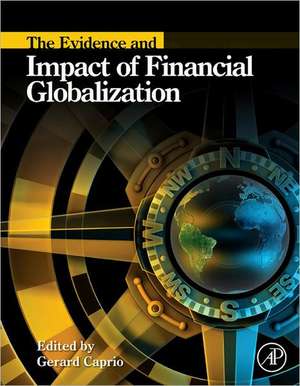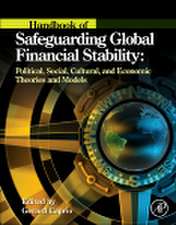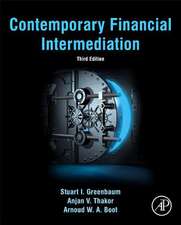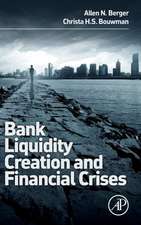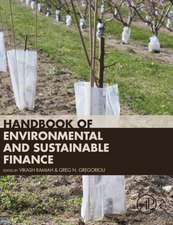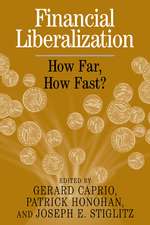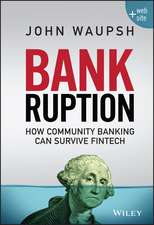The Evidence and Impact of Financial Globalization
Gerard Caprioen Limba Engleză Hardback – 13 dec 2012
- Substantial articles by top scholars sets this volume apart from other information sources
- Rapidly developing subjects will interest readers well into the future
- Reader demand and lack of competitors underline the high value of these reference works
Preț: 761.12 lei
Preț vechi: 1041.58 lei
-27% Nou
Puncte Express: 1142
Preț estimativ în valută:
145.69€ • 158.30$ • 122.46£
145.69€ • 158.30$ • 122.46£
Carte tipărită la comandă
Livrare economică 14-28 aprilie
Preluare comenzi: 021 569.72.76
Specificații
ISBN-13: 9780123978745
ISBN-10: 0123978742
Pagini: 800
Dimensiuni: 216 x 276 x 43 mm
Greutate: 2.25 kg
Editura: ELSEVIER SCIENCE
ISBN-10: 0123978742
Pagini: 800
Dimensiuni: 216 x 276 x 43 mm
Greutate: 2.25 kg
Editura: ELSEVIER SCIENCE
Public țintă
Undergraduates and graduate students worldwide working in all areas of finance and economics. Researchers will typically be examining the global aspects and implications of their particular interests.Cuprins
Safeguarding Global Financial Security (38 articles)
Recenzii
"Editor Caprio…presents empirical research on the forces behind financial globalization, such as international capital flows, foreign bank participation in developing countries, and international government debt." --Reference and Research Book News, February 2013
"This volume provides authoritative non-technical coverage of key topics related to the globalization of financial activities and institutions, with particular and up-to-date analyses of international financial crises." --Josef Brada, Arizona State University
"The Evidence and Impact of Financial Globalization is a collection of essays written by major specialists in each specific field of globalization, ranging from aid, foreign investment and migration to exchange rates, international government debt and financial crisis. Its 50 chapters investigate the various aspects of globalization, their determinants and impact both in abstract terms and with reference to specific countries and regions. It is an essential companion for those that want to up-date and improve their knowledge of the impressive significance acquired by financial globalization in the last two or three decades." --Nicola Acocella, Università degli Studi di Roma "La Sapienza"
"Is mainstream theory the cause of our recent financial crisis, and will it be to blame for future crises? If theory did not cause it, it did nothing to prevent or even mitigate it. This book offers an impressive series of essays on the Great Recession, investigating financial and real causes, historical episodes, and linkages as well as domino effects. It clearly illuminates the background of our recent crisis by offering clear theoretical, empirical, and historical views of its remote causes. It cannot be absent from any economist's bookshelf." --Mauro Gallegati, Università Politecnica delle Marche
"This volume provides authoritative non-technical coverage of key topics related to the globalization of financial activities and institutions, with particular and up-to-date analyses of international financial crises." --Josef Brada, Arizona State University
"The Evidence and Impact of Financial Globalization is a collection of essays written by major specialists in each specific field of globalization, ranging from aid, foreign investment and migration to exchange rates, international government debt and financial crisis. Its 50 chapters investigate the various aspects of globalization, their determinants and impact both in abstract terms and with reference to specific countries and regions. It is an essential companion for those that want to up-date and improve their knowledge of the impressive significance acquired by financial globalization in the last two or three decades." --Nicola Acocella, Università degli Studi di Roma "La Sapienza"
"Is mainstream theory the cause of our recent financial crisis, and will it be to blame for future crises? If theory did not cause it, it did nothing to prevent or even mitigate it. This book offers an impressive series of essays on the Great Recession, investigating financial and real causes, historical episodes, and linkages as well as domino effects. It clearly illuminates the background of our recent crisis by offering clear theoretical, empirical, and historical views of its remote causes. It cannot be absent from any economist's bookshelf." --Mauro Gallegati, Università Politecnica delle Marche
